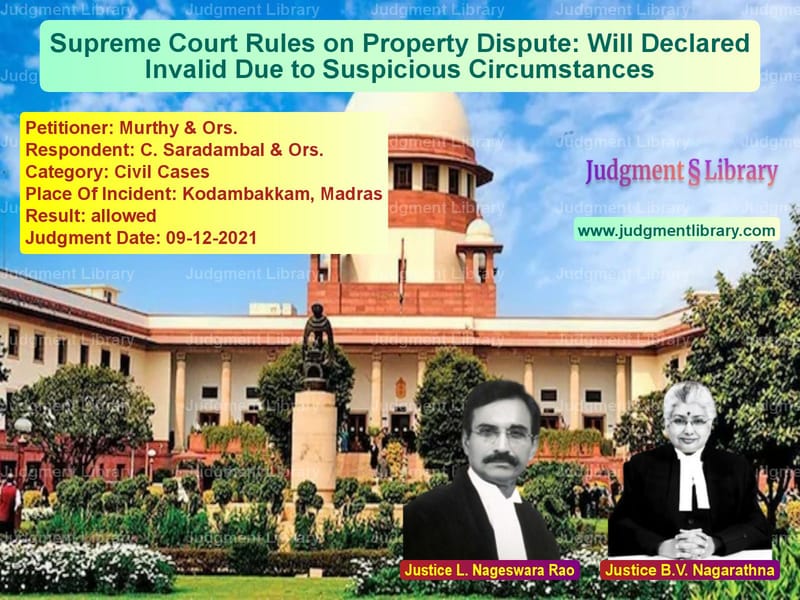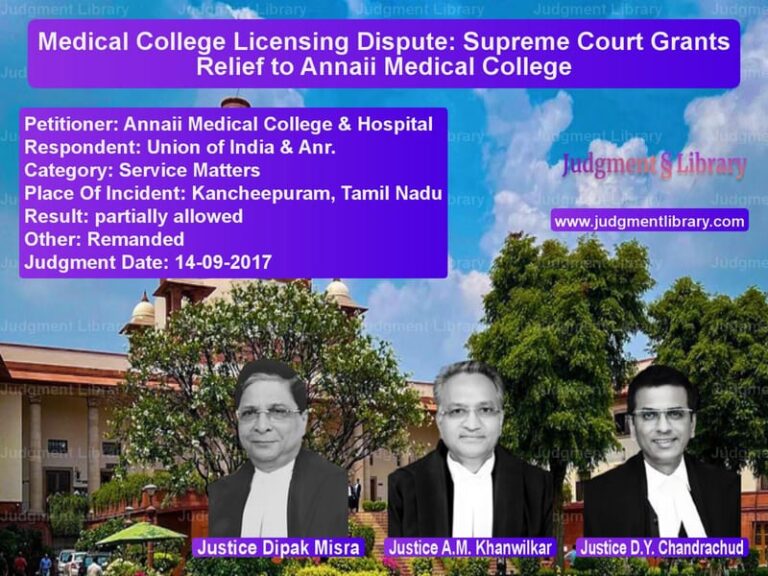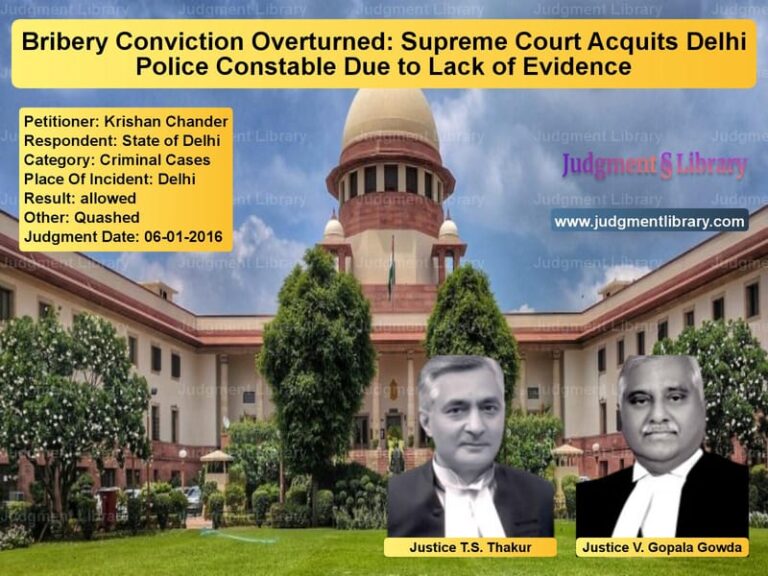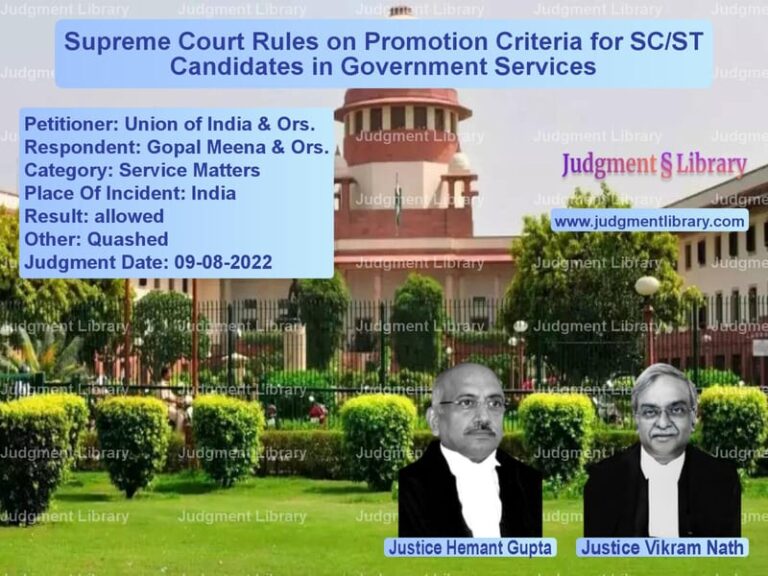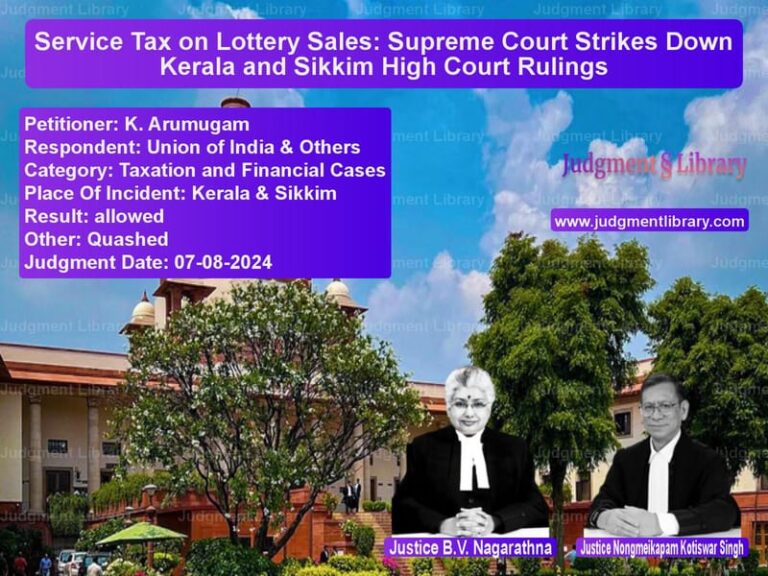Supreme Court Rules on Property Dispute: Will Declared Invalid Due to Suspicious Circumstances
The Supreme Court of India recently ruled on a long-standing family property dispute in Murthy & Ors. vs. C. Saradambal & Ors., concerning the alleged will of one E. Srinivasa Pillai. The dispute revolved around whether a will allegedly executed by the deceased was genuine or a forged document designed to disinherit his daughters in favor of his son and his widow. After extensive litigation, the Supreme Court overturned the High Court’s ruling and reinstated the trial court’s decision, declaring the will invalid due to multiple suspicious circumstances surrounding its execution.
Background of the Case
The legal battle began when C. Saradambal, the widow of the deceased’s son, filed a case for the grant of Letters of Administration, claiming that the will of E. Srinivasa Pillai bequeathed the entire estate, including the house property, solely to his son, S. Damodaran. The will, allegedly executed on January 4, 1978, excluded the testator’s daughters from any share in the estate. The testator, however, passed away just 15 days later, on January 19, 1978.
The daughters of the deceased, who were left out of the will, challenged its validity, arguing that it was a forged document and that their father, who was bedridden due to a severe paralytic attack, was incapable of executing a will. They contended that the document had been fabricated years later to deprive them of their rightful inheritance.
Petitioners’ Arguments
- The daughters contended that their father had suffered a paralytic stroke and was completely bedridden before his death, making it impossible for him to have executed the will.
- The will had surfaced only 15 years after the testator’s death, casting serious doubts on its authenticity.
- The signature on the will did not match the known handwriting of the deceased.
- The attesting witnesses were not known associates of the deceased but were instead connected to the widow of his son.
- The will was an unregistered document, despite the fact that the deceased’s son, who allegedly inherited the estate, was a practicing advocate.
Respondents’ Arguments
- C. Saradambal, the widow of the deceased’s son, argued that the will had been lawfully executed in the presence of two attesting witnesses.
- She claimed that there was no legal requirement for a will to be registered and that mere delay in producing the document did not render it invalid.
- She contended that the will had been in the possession of her late husband and had only been produced in court when required.
- She further claimed that the daughters of the deceased were attempting to unlawfully claim a share of the property despite the clear testamentary wishes of their father.
Trial Court’s Verdict
The trial court dismissed the claim for Letters of Administration, ruling in favor of the daughters. The judge noted multiple suspicious circumstances surrounding the will:
- The testator had been bedridden and incapable of signing any document.
- The document was produced only after 15 years, raising serious doubts about its authenticity.
- The son of the deceased, who allegedly inherited the property, never mentioned the will in his lifetime.
- The witnesses to the will were not credible, and their testimonies contained inconsistencies.
- The signatures on the will did not match other documents known to have been signed by the deceased.
High Court Reversal
The High Court overturned the trial court’s decision and ruled in favor of Saradambal, granting Letters of Administration. The Division Bench observed:
“The proof and validity of the will have to be examined based on legal principles, attesting witnesses, and a comparison of the testator’s signatures. The reasoning of the trial court cannot be sustained.”
The High Court dismissed concerns about the delay in producing the will, stating that such delays are not uncommon in inheritance disputes.
Supreme Court’s Final Ruling
The Supreme Court reinstated the trial court’s decision, ruling that the will was invalid due to overwhelming suspicious circumstances. The bench comprising Justices L. Nageswara Rao and B.V. Nagarathna observed:
“The execution of the will is itself suspicious, and the evidence regarding its execution has not dispelled these suspicions. The respondents have failed to prove the will to the satisfaction of the court.”
The Court noted several key factors:
- The testator died within 15 days of allegedly executing the will, yet no effort was made to register the document.
- The will was not disclosed for 15 years, despite the son being a lawyer.
- The attesting witnesses had no known association with the deceased.
- There were contradictions in witness testimonies about the presence of family members at the time of execution.
- The signature on the will did not match the testator’s known handwriting.
In concluding, the Supreme Court ruled:
“A will must be proved beyond reasonable doubt, especially when its validity is challenged. Given the circumstances, we find the document in question to be a product of fabrication.”
Key Takeaways
- Wills must be free from suspicious circumstances to be deemed valid.
- A long delay in producing a will can cast doubt on its authenticity.
- If a testator is physically incapacitated, the burden of proving the will’s validity is significantly higher.
- The Supreme Court reaffirms that a will must satisfy the conscience of the court before being accepted.
This ruling reinforces the principle that inheritance cases must be adjudicated with caution, ensuring that fraudulent claims do not deprive rightful heirs of their legal share.
Petitioner Name: Murthy & Ors..Respondent Name: C. Saradambal & Ors..Judgment By: Justice L. Nageswara Rao, Justice B.V. Nagarathna.Place Of Incident: Kodambakkam, Madras.Judgment Date: 09-12-2021.
Don’t miss out on the full details! Download the complete judgment in PDF format below and gain valuable insights instantly!
Download Judgment: murthy-&-ors.-vs-c.-saradambal-&-ors.-supreme-court-of-india-judgment-dated-09-12-2021.pdf
Directly Download Judgment: Directly download this Judgment
See all petitions in Succession and Wills
See all petitions in Property Disputes
See all petitions in Judgment by L. Nageswara Rao
See all petitions in Judgment by B.V. Nagarathna
See all petitions in allowed
See all petitions in supreme court of India judgments December 2021
See all petitions in 2021 judgments
See all posts in Civil Cases Category
See all allowed petitions in Civil Cases Category
See all Dismissed petitions in Civil Cases Category
See all partially allowed petitions in Civil Cases Category

